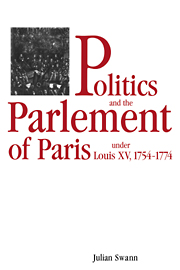Book contents
- Frontmatter
- Contents
- Dedication
- Preface
- List of abbreviations
- 1 Introduction: the Parlement of Paris
- 2 Historians and the parlements
- 3 The king and his judges
- 4 The parti janséniste and the refusal of the sacraments crisis, 1754–1756
- 5 Managing the parlements: crisis and compromise, 1756–1758
- 6 The Parlement and fiscal politics, 1756–1763
- 7 Choiseul and the politics of appeasement, 1758–1763
- 8 An unhappy peace, 1763
- 9 Defending La Chalotais: the Brittany affair, 1764–1766
- 10 In the eye of the storm, 1767–1770
- 11 The fall of the Parlement of Paris, 1770–1771
- 12 Conclusion: Maupeou and beyond
- Bibliography
- Index
7 - Choiseul and the politics of appeasement, 1758–1763
Published online by Cambridge University Press: 13 March 2010
- Frontmatter
- Contents
- Dedication
- Preface
- List of abbreviations
- 1 Introduction: the Parlement of Paris
- 2 Historians and the parlements
- 3 The king and his judges
- 4 The parti janséniste and the refusal of the sacraments crisis, 1754–1756
- 5 Managing the parlements: crisis and compromise, 1756–1758
- 6 The Parlement and fiscal politics, 1756–1763
- 7 Choiseul and the politics of appeasement, 1758–1763
- 8 An unhappy peace, 1763
- 9 Defending La Chalotais: the Brittany affair, 1764–1766
- 10 In the eye of the storm, 1767–1770
- 11 The fall of the Parlement of Paris, 1770–1771
- 12 Conclusion: Maupeou and beyond
- Bibliography
- Index
Summary
The period between the fall of cardinal de Bernis in November 1758 and the end of the Seven Years War in February 1763 set the boundaries for the conduct of court and judicial politics in the final years of the reign. Military defeats suffered not only in the colonial conflict with England, but also in the European War, notably against Frederick II of Prussia, shattered French prestige. Respect drained away from the monarchy and from a king whose response to national humiliation was to remain in Versailles rather than seek to remedy the situation at the head of his armies. Clearly, the parlements were no more than spectators of military and diplomatic affairs, but their resistance to the financial demands of the war was certainly encouraged by an awareness of the crown's loss of self-confidence and public esteem. Confronted by these problems, the ministry showed a marked lack of direction, reflecting its own instability and internal divisions. However, the gradual consolidation of the duc de Choiseul as the principal figure in the government after 1761 did have significant ramifications. By temperament he was inclined to compromise with the magistrates, and he ended a long-running crisis involving the Parlement of Besançon to their satisfaction. More importantly, out of political expediency, perhaps even a hint of conviction, Choiseul unleashed the Parlement of Paris against its old adversaries the Jesuits.
- Type
- Chapter
- Information
- Politics and the Parlement of Paris under Louis XV, 1754–1774 , pp. 193 - 217Publisher: Cambridge University PressPrint publication year: 1995

